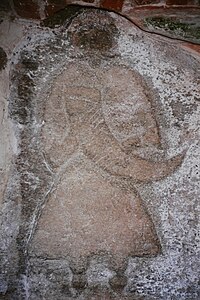Slavic Paganism

Slavic paganism is the religion of some people who lived long ago in Eastern Europe. They believed in lots of different gods and goddesses who they thought controlled different parts of the world, like the Sun, the Earth, and the Moon. They also believed that these gods and goddesses could help them with different things in their lives, like farming or hunting.
The Slavic pagans had lots of different rituals and traditions to honor these gods and goddesses. They would make offerings to them, like food or special objects, and ask for their help. They would also hold festivals and celebrations to remember and honor them.
One of the most important gods for the Slavic pagans was Perun, the god of thunder and lightning. They believed that he controlled the weather and could protect them from harm. Another important goddess was Mokosh, who was connected with fertility and women's work. The Slavic pagans believed that she could help them with childbirth and weaving.
Over time, many people in Eastern Europe started to convert to other religions, like Christianity or Islam. This meant that Slavic paganism slowly declined and became less common. However, some people still practice it today as a way to connect with their ancestry and cultural heritage.
The Slavic pagans had lots of different rituals and traditions to honor these gods and goddesses. They would make offerings to them, like food or special objects, and ask for their help. They would also hold festivals and celebrations to remember and honor them.
One of the most important gods for the Slavic pagans was Perun, the god of thunder and lightning. They believed that he controlled the weather and could protect them from harm. Another important goddess was Mokosh, who was connected with fertility and women's work. The Slavic pagans believed that she could help them with childbirth and weaving.
Over time, many people in Eastern Europe started to convert to other religions, like Christianity or Islam. This meant that Slavic paganism slowly declined and became less common. However, some people still practice it today as a way to connect with their ancestry and cultural heritage.
Related topics others have asked about:
